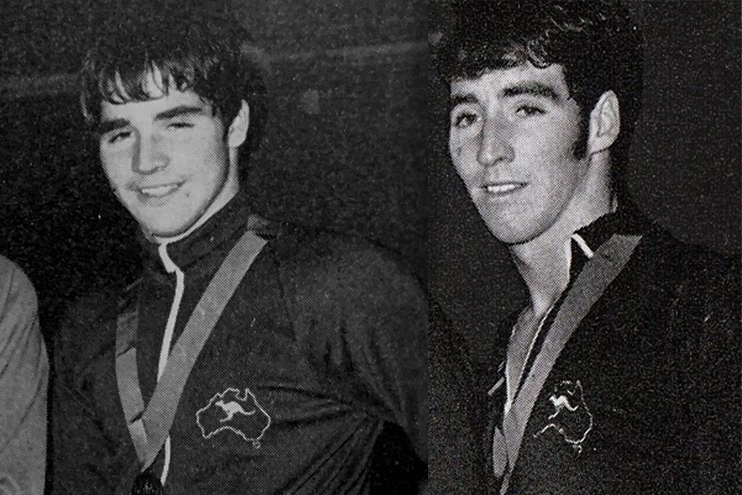
Australian swimming siblings Neil and Greg Rogers were stars of the pool for Australia in the late 1960s and 1970s. Neil Rogers reminisces on the Edinburgh 1970 Commonwealth Games, the controversies leading up to the Games, and the Rogers legacy in Australian swimming history.
By Ian Hanson
Neil Rogers remembers vividly the night anti-apartheid protesters threw black powder dye bombs into Sydney’s Drummoyne Olympic Pool.
It was February 27, 1970 and the opening night of the National Swimming Championships – doubling as the Selection Trials for the Australian Commonwealth Games Swim Team for the Edinburgh Games and for an Australian select team to tour South Africa in the lead-up.
Rogers was just 16-years-old and in his final year at Randwick Boys High – a rising star of the pool, who had his sights set on following big brother Greg Rogers into the Australian Swim Team and hopefully a University scholarship in the United States.
Brother Greg, at 21-years-old, was already a celebrated silver and bronze medallist from the 1968 Mexico Olympics and was described by Neil as “a rockstar” of Australian swimming said.
While Neil was considered an outside chance of making the 1970 Commonwealth Games Team, Greg was amongst a world-class group of Australian men’s freestylers, and considered a certain starter for Edinburgh.
But before they could compete in view of the Scottish Highlands of Edinburgh, the Rogers needed to qualify for the national team, swimming in a dyed black pool.
Swimming Australia had planned a trip for its National Team to tour South Africa straight off of the Trials – and that alerted an active Sydney-based protest group that had a well-oiled itinerary of disruptions planned against apartheid practices in South Africa.
On opening night of the trails, protesters drove down a road connecting to the outdoor pool and tossed paper bags of black powder dye into the pool from the near-by Iron Cove bridge – delaying the start of the Championships – with two of the men found hiding out in a Hotel in The Rocks – arrested but released without charge.
A men’s freestyle final was due to kick-start proceedings and while waiting for the water to clear, officials decided to start the program with a women’s backstroke race.
It was duly won by 1968 Mexico Olympic relay silver medallist Lynne Watson from Western Australia – who went on to maintain her recent unbeaten Nationals run – adding to what would be an impressive Australian Championship gold medal tally of 10 – between 1967 and 1970.
Watson and dual 1968 Olympic champion Mike Wenden would both go on to become the most successful swimmers on the Australian team in Edinburgh – each winning four gold and a silver medal – continuing their stellar careers in the pool.
But for the surf club born and raised Rogers brothers, who spent their weekend’s at the famous Clovelly Surf Lifesaving Club, the hullaballoo around the protests was like water off a duck’s back.
They just wanted to swim and knew if they performed then trips to both South Africa and Edinburgh were in the offing.
All eyes were on Neil – who was the centre of quite a public spat with his then personal coach and National Team coach Don Talbot – quitting his star-studded men’s squad at Auburn Swim Club just three weeks before the Trials – much to the bewilderment of his parents.
Neil takes up the story.
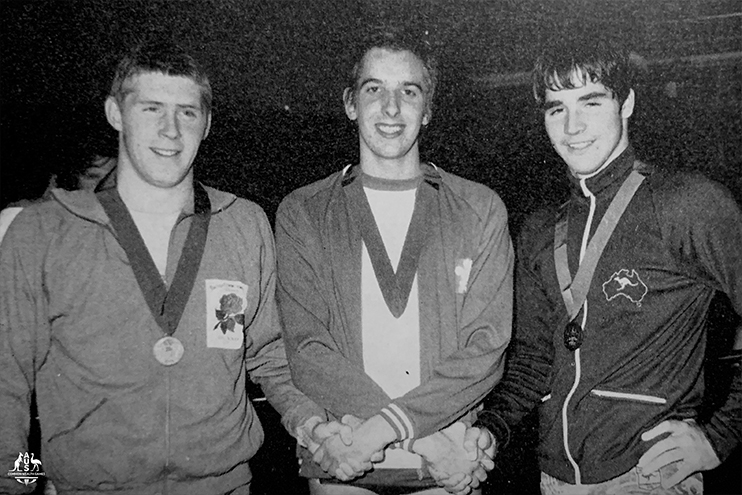
Neil Rogers (right) won bronze in the 200m Backstroke. (CGA Archive)
“With the possibility of going to South Africa, Graham Windeatt, Jimmy Findlay and myself went and had our (mandatory) smallpox shots in case we made the team,” Neil said.
“My arm swelled up after seven or eight days and I am at the Auburn Pool this one morning and can’t lift my arm….and Don decided to give me a four-mile kick set.
“I was in considerable pain, it was raining and I was done after two miles….but Don was adamant I had to complete the set…but there was no way I was could it.
“So it was the last time I swam with Don; although there were no hard feelings over the next few years with Don on the National team, he held no grudges and either did I.”
But Neil’s move to new coach John Gregory at Victoria Park on the fringe of Sydney’s CBD and closer to the Rogers family home in Coogee than the train trip to Auburn, proved to be fortuitous.
When he arrived at Victoria Park, Neil was in good shape and it made him determined to do well at the Nationals.
“I was maybe hoping to make the team and then I’ve come out and won three golds at the Nationals and I was the first picked…!!!” said Rogers.
“I actually won the 200m backstroke from lane one on the night they threw the dye in the pool and I then won the 100m backstroke and added 100m butterfly on the final night and was picked to go to South Africa and on the Commonwealth Games team.
“It was great and I remember journalist Geoff Prenter was writing in the papers back then and we had the school carnival on the Monday after the Nationals….so I turned up to the newspaper headlines of “Commonwealth Games star back in school pool’ which was a huge thrill.”
Big brother Greg was also named on both teams and it was the start of an era that would see the Rogers boys dominate Australian swimming and surf lifesaving and continue to create news headlines.
Neil had plenty of praise for both John Gregory and Don Talbot.
“I was lucky where John gave me a lot of one-on-ones and worked on my fly and the rhythm; Talbot had me in great shape and John managed and tapered me for the three weeks and I had a good Nationals,” Neil said.
“John knew a lot about the rhythm of butterfly and the technique; he was a very, very knowledgeable man; while Talbot was brilliant in different areas; he was great on drills and he was great for getting people ready to race.”
Fast forward to July, and the Rogers boys brought home five medals between them from the Edinburgh Games, winning two gold, two silver and one bronze medal.
With Greg further cementing his status a star of the pool.
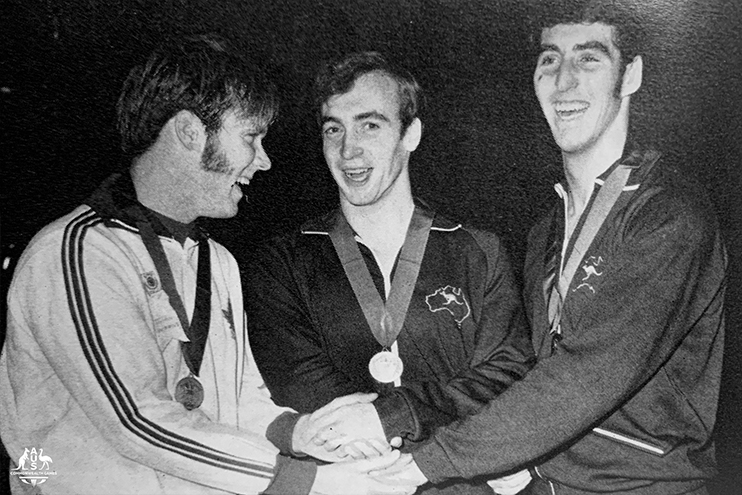
Greg Rogers (right) won bronze in the 200m Freestyle. (CGA Archive)
Greg had joined Michael Wenden, Robert Windle and Graham White in Mexico to win Olympic silver in the 4x200m freestyle and bronze in the 4x100m freestyle, while in Edinburgh the relay boys were on top of the world.
He combined with dual Olympic champion Wenden, White and Neil’s Games’ roommate Bill Devenish, to win gold in the 4×200 freestyle relay – this time in a world record time – breaking the US stranglehold on the event and the six-year mark set by the Don Schollander led Americans at the 1964 Olympics in Tokyo.
Greg also won a brace of silver medals behind Wenden in both the 100 and 200m freestyle before combining with Devenish and White for the foursome to add further gold in the 4x100m freestyle relay – edging out the Canadians.
Neil christened his Australian team debut – that would see him join Greg at the 1972 Munich Olympics – with bronze in the 200m backstroke and silver as the backstroker in the 4x100m medley alongside Findlay, Paul Jarvie and Wenden.
Men’s 4x100m Freestyle relay final from the Edinburgh 1970 British Commonwealth Games. (Supplied)
Neil reflected on what were great times saying if he, Greg and their late brother Ron, an Australian surf belt champion, were not in the pool they were in the surf.
Although coach Talbot didn’t always approve of his charges mixing their Olympic swimming careers in the waves.
“But I tell you what, it did do,” said Rogers, “it got us fit….you try going in four or five surf races on a Saturday and a Sunday and all of a sudden for someone (like me) not known for his fitness…you get fit awful quick and you were jumping through hoops…doing all those ins and outs.
“But going to a work out with Talbot was like a National final; they all came down from Queensland and swam with him.”
But the Rogers brothers brush with the anti-apartheid controversy was far from over and on their return from Edinburgh they found themselves caught up in the middle of another Page One protest – this time at the beach.
Neil and ironman Ken Vidler (1980 Olympics kayak representative) were named as the juniors and Greg was amongst the open men named on the Australian Surf Lifesaving Team for a Three-Test Series against the visiting South Africans – that would include famous freestyle sprinter Jonty Skinner.
Skinner would go on to break 1976 Olympic champion Jim Montgomery’s world record for 100m freestyle before a stellar Collegiate coaching career and as head of the US Swimming National Team.
“There were big protests at the Tests matches in Lorne, at Burleigh Heads and the one at Coogee, where there were major demonstrations,” recalled Rogers.
“I was like a sponge sucking it all up but looking back on it all – it was certainly a steep learning curve in life that’s for sure….
“Denis Heussner (a 1972 and 1976 Olympic kayaker) was our team captain and I remember winning the clean sweep of senior and junior surf races and the junior belt.
“And Jonty waiting for me around the buoys at Burleigh and next thing ‘whack’ a foot in the mouth and I wonder what struck me.
“But I did get the last laugh when I cracked a small wave past him and won the race in the run up the beach.
“I did the same thing to Greg at Coogee – and he wasn’t happy either – but that’s surf.”
Neil re-wrote the record books for the 100m butterfly – breaking Olympic champion Kevin Berry’s long-standing Australian record from 1964 and set in a heat at the NSW Championships at Heffron Park in 1971 – eventually taking the mark from 58.50 in seven record breaking swims to 55.47 in 1976.
The boys enjoyed a special time in 1972 when they were named on the Swim Team for the Munich Olympics where Neil qualified for the final the 100m butterfly won by Mark Spitz and Greg was eliminated in the semi-finals of the 100m freestyle.
Neil would win the 100m butterfly gold at the 1974 Commonwealth Games in Christchurch in a Games record time having snapped the cord on his costumes moments before the race and leaving the pool deck for a new pair.
With his mum and dad in the grandstand, Neil returned to take the gold medal in a new Games record time of 56.58 – ahead of Canadian pair Byron McDonald and Bruce Robertson – adding silver behind Canada in the 4x100m medley with Mark Tonelli, Nigel Cluer and Michael Wenden.
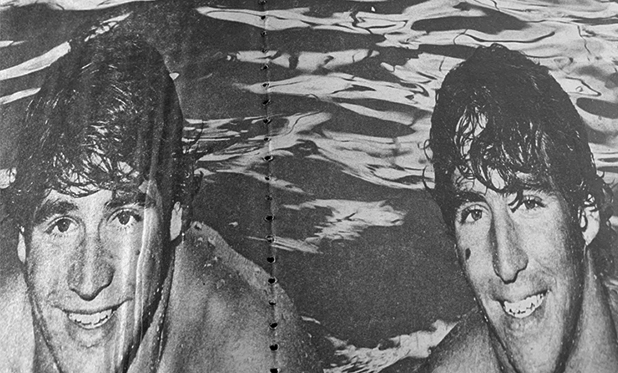
Neil and Greg Rogers. (Supplied)
A sign of the Rogers popularity of the times, the brothers’ headline acts continued into 1974, when Greg and Ron appeared nude in the August edition of The Australian Playgirl Magazine, creating enormous publicity while Neil was attending the University of Wisconsin.
“There were stories that I was also in the magazine and while I was keen to join the boys I had to turn it down; it would have encroached on my amateur status, but I went along for the ride, just for the fun of it,” recalled Neil.
“Ronny had just won the Australian open belt title and Greg had retired from swimming so they were right, but it certainly generated a lot of interest.”
The Rogers brothers hold two unique records in the annals of swimming and surf lifesaving – becoming the only brothers to win an Australian Open Belt Race championship (Ron in 1972 and Neil in 1976) and the only two brothers to win the Australian Open 100m freestyle title (Greg in 1969 and Neil in 1974).
Neil is now the mine host at the famous Bondi Icebergs where he is the manager and coach, also coaching a group of energetic seniors at an Eastern Suburbs nursing home.
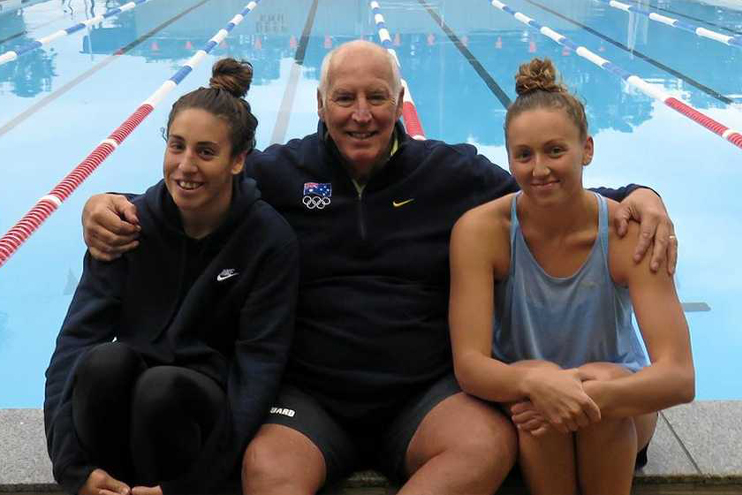
Greg Rogers with his daughters Dahlas and Lana. (Noosa News)
While Greg has also been active in the Queensland Aquatics industry operating pools and coaching on the Sunshine Coast and in Far North Queensland.
His two daughters Lana and Dahlas are also outstanding competitors – Lana has won the Australian Ironwoman and Coolangatta Gold titles with Noosa while Dahlas is one of Australia’s emerging middle distance freestyle stars under National Team coach Chris Mooney at USC Spartans on the Sunshine Coast.
While it has been 50 years since the brothers launched off of the starting blocks and into the Australian sporting record books, the Rogers name continues to ride the waves of success in the world of swimming and surf lifesaving in Australia.
